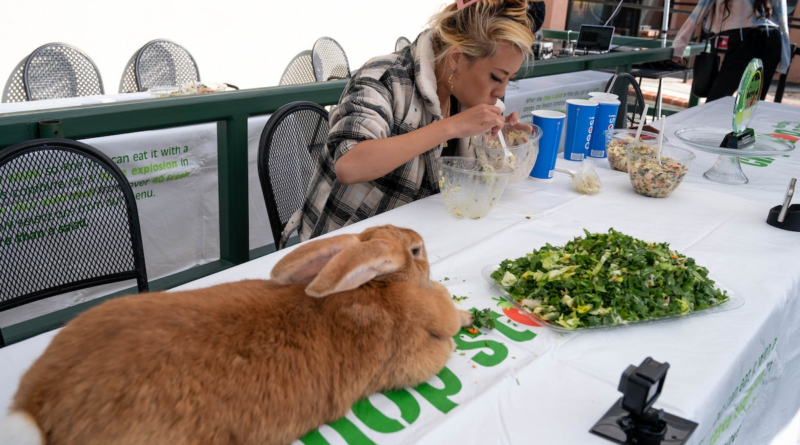A Place For Funny Stories That Don’t Matter – Gawker
I gravitate to wire service oddities
Welcome to Net Positive, a series about nice places and things on the world wide web.
In February, the media had several feuds to follow, so this one got lost in the shuffle: professional competitive eater Raina Huang going “head-to-whiskers” in a chopped salad-eating contest against a Giant Flemish rabbit named “Honey ‘Mega’ Bunny.” This showdown, organized by a West Coast salad chain, ended in swift tragedy. While Huang scarfed 3.5 pounds of minced lettuce in 10 minutes, Mega wouldn’t touch her salad. Organizers were forced to tap in a second rabbit named Precious; but she too “failed to eat a single leaf.” It was a “humiliating loss.” Still, their breeder took it on the chin. “Rabbits are not scarfers,” he explained. “They’re nibblers. They nibble all day, all night.”
I read about Mega in an unlikely outlet: the British-Canadian news agency Thomson Reuters. Reuters, like its American rival the Associated Press, is an old-school wire service; so old that when Paul Julius Reuter founded its precursor in 1849, he broke news by way of carrier pigeon. (The AP also had an old and animal-related origin, breaking Mexican War updates by pony express.) Both services now cover hard news with an emphasis on speed: homepage tickers with minute-by-minute market data; side-bars on the latest news out of Ukraine; timestamps with the precise number of minutes elapsed since a given article went up. This is not a concern born from the internet’s accelerating availability of information, but a long-standing obsession. In 2008, Reuters published a timeline of every story they broke first going back to Abraham Lincoln’s assassination. Technically, they broke the latter first only in Europe; across the pond, the AP had already gotten it out.
The services’ fetish for speed, among other things, yields an especially spare news style. An early AP bureau chief once described their dispatches as “merely dry matters of fact and detail,” and even that overstates their editorial flair. But everyone lets loose now and again and the leading global news agencies have their own outlets for fun. They are also places that bring me delight. For Reuters, it’s a vertical of “weird, wonderful, & odd” news called “Oddly Enough.” For the AP, it’s a vertical of “weird & funny” news called “Oddities.” For convenience, I’ll call them the Odds.
The Odds are governed by a different logic than their news agency hosts. For one, they are slow; if two stories trickle out in a single afternoon, it’s been a busy week. Probably related: they have a touch-and-go relationship with the concept of “news,” in that any given story’s newsworthiness lies mostly in the fact of it having happened recently. These reports are not urgent or important. They are not useful in any political, social or economic capacity, or otherwise relevant to the agencies’ broad swathes of global readers. They are mostly the opposite: useless in every capacity and irrelevant to all but a single-digit few. You do not need them “now, more than ever.” You probably don’t need them at all. Even their subjects concede as much. Consider the Lithuanian woman quoted in a recent Reuters installation about mail that arrived five decades late. “The letter was inconsequential,” she said in a classic Lihuanian deadpan. “The loss was not life-changing.”
The two services have subtly different tastes in eccentric anecdotes. Reuters’ selection skews uplifting, culling anecdotes you’d find on a Snapple cap or an outdated box set of Trivial Pursuit — buttoned-up, vaguely British, and maybe curated by someone who says “chortle.” These tend to involve animals (“German wildlife park renames Putin the pig”), inventions (“Japanese robot can peel bananas cleanly, most of the time”) or both: “Birth control for Columbia’s hippos: Contraceptive darts.” The AP samples from a darker strain of existential oddity, a kind inflected by schadenfreude and populated by Darwin Award contenders. Take the Washington woman who recently dropped her phone in a mountain-top outhouse. She fashioned a harness from dog leashes, climbed after her cell, fell in the toilet, and got trapped in a tunnel of hiker shit so deep that firefighters had to drag her out with a rope. That same kind of noble idiocy runs through stories like:
The broad appeal of Odds fodder is less their utility, than how they distill the breadth of terrestrial stupidity, human or otherwise. The narrower pleasure though, is in their execution. In any given Odds piece, the subject matter is in open conflict with the format. These are stories so inane that their mere existence implies an editorial wink; the media’s stoniest editors have conceded they are, in fact, “odd.” But the editorializing ends there; the copy itself is unfailingly serious. Wire services have clung to the old journalism tenet of restrained objectivity — a model that has fallen dramatically out of favor. The common complaint is that even straight reporting still betrays some opinion, subtext always strains at the seams. But in stories so deeply unimportant, that can be nice. Consider this official TSA quote in a recent AP item, “10-inch knife found in baby car seat at Boston airport:”
The Odds are part of a media diet completely out of step with time, both in form and substance. One might think that the metric for weird stories would be different now than it was a decade ago, if only to keep up with an increasingly strange news cycle. If they have, it’s not easy to find out. Neither Reuters nor the AP responded to requests for comment, and Oddities aren’t mentioned in any of the services’ official histories. A Newspapers.com search for “Reuters” and “odd” mostly turned up 19th-century telegrams and ads for W.S. Woodin’s “Olio of Oddities,” a touring one-man show that described itself as “an entirely new and original mimical, musical, pictorial, polygraphic, and panoramic entertainment.”
But a similar search for the Associated Press showed that the agency has been covering human foibles with affectless consistency for at least eight decades. The only discernible difference is length. “Anne Auernik, 21, was kicked by a wooden horse,” reads one August 1938 edition. “The horse was on a merry-go-round and Miss Auernick stood too close to it while it was whirling.” Neither section is likely to win a Pulitzer any time soon. But they are an intermittently sweet and funny alternative to the depressing news of the days, and one that has, as everything gets odder, more or less stayed the same.
Previously: This is Chef John, from Food Wishes




